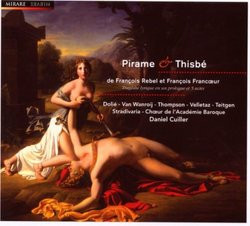| All Artists: Thomas Dolié, Francois/Francoeur, Francois Rebel, Daniel Cuiller, Stradivaria, Jeffrey Thompson, Katia Velletaz, Judith van Wanroij, Jean Teitgen, Adele Carlier, Lénor Leprêtre Title: François Rebel and François Francoeur: Pirame et Thisbé Members Wishing: 1 Total Copies: 0 Label: Mirare France Original Release Date: 1/1/2008 Re-Release Date: 8/12/2008 Album Type: Import Genre: Classical Style: Opera & Classical Vocal Number of Discs: 1 SwapaCD Credits: 1 UPCs: 3760127220589, 400000011059 |
Search - Thomas Dolié, Francois/Francoeur, Francois Rebel, Daniel Cuiller :: François Rebel and François Francoeur: Pirame et Thisbé
 | Thomas Dolié, Francois/Francoeur, Francois Rebel, Daniel Cuiller François Rebel and François Francoeur: Pirame et Thisbé Genre: Classical
|
Larger Image |
CD DetailsSimilar CDs |
CD ReviewsA forgotten opera from two forgotten composers Zaida | Bremerton, WA | 08/13/2008 (5 out of 5 stars) "For those familiar with the story of Pyramus and Thisbe, the plot of this work may seem a little off, especially from Ovid. While still set in ancient Babylon, the librettist abandoned the idea of it being a simple love story between two youths, perpetuated by a hole in the wall. Instead, while the above could have happened before the beginning of the action, we have a slightly different story. Pirame and Thisbé are still in love, but the king, Ninus, also loves Thisbé. Zoraïde, daughter of Zoroastre, is betrothed to Ninus, who tries to convince Pirame, apparently a hero here, marry her, thus leaving him free to marry Thisbé. Pirame doesn't tell Ninus of his relationship, and is imprisoned when this is found out. In the meantime, Zoroastre descends, telling Zoraïde that he intends to vindicate her, regardless of the consequences. She protests, but he will not have it. Zoroastre's followers destroy the prison, releasing Pirame, and he arranges to meet with Thisbé in a forest, among the tombs of Assyrian kings. The final act is very much as it is in Ovid, except that Ninus shows up immediately after Pirame's death, not noticing the body. He accuses Thisbé of being unfaithful to him for fleeing with a rebel, but panics when she points out the body of Pirame. He quickly apologizes, offering his pity, but Thisbé will not have it. Instead, she accuses him of lying and then commits suicide.
Quite simply, I didn't know what to expect from this, as it comes from a period with very few recordings representing the French composers at the time, with the exception of Rameau. The composers of this work, François Rebel (son of the better known Jean-Fréry Rebel) and François Francoeur, are more restrained than their older contemporary though, and it is hard to know how much this version is different from the original of 1726, as it is presented here in it's final incarnation, dating from 1771. And with it being a late version, it makes an interesting comparison to Gluck's French operas, some of which were performed only three years after this final revision. Oddly, however, even this keeps a prologue, something which was typically non-existent in tragedie lyrique after the 1750s, with it being cut even in revivals of Lully's works. Along with 'Sémélé' by Marais and the forthcoming recording of Lully's 'Proserpine', both by Niquet and Le Concert Spirituel, this is one of the operatic highlights of this year. The music itself is much like that of other French composers of the mid-eighteenth century, such as Boismortier and Leclair. The influence of Lully are by this time becoming faded, and it is obvious that Rameau was held in high regard by the composers represented here, even if they aren't quite as adventurous. Francoeur would later use some pieces from this opera in his later Festin Royale pour le Comte d'Artois, which is considered one of the last purely "French" pieces of the time. The final scene does sound a little like the first part of 'Enfin, il est en ma puissance' from Gluck's version of 'Armide', but overall, this work feels much more subdued than any of that composer's later operas. It is far from undramatic, however, and well worth hearing. The one weakness in this recording is the Ninus of Jeffrey Thompson. While his voice suits the role, especially in the final scene, he sounds slightly paranoid in some of the earlier moments in the opera. But considering the character, this may not be a bad thing. At any rate, Pirame leaves one wondering when we'll get to hear other forgotten tragedies, such as those by Dauvergne and Mondonville, or the other collaborations between Francoeur and Rebel for that matter." |

 Track Listings (12) - Disc #1
Track Listings (12) - Disc #1
